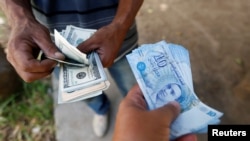For more on the preliminary agreement between the IMF and Tunisia, VOA’s Mohamed Elshinnawi spoke to Radawan Masmoudi, the President of Center for the Study of Islam and Democracy.
The interview was edited for brevity and clarity.
VOA: Do you think President Kais Saied will abide by the term agreements set by the IMF that will witness Tunisia receiving the $1.9 billion loan which could potentially revive the north African nation’s economy?
Masmoudi: Over the past 14 months President Kais Saied has shown that he will not listen to or consult anybody, which shows that he has no interest in real dialogue with other political or economic organizations.
Without the popular support from other Tunisian organizations, the reforms called for by the IMF will undoubtably fail because they require both support and understanding from the masses, as they must know why these reforms are necessary.
The reforms will be seen as imposed by the IMF and people do not trust what the IMF wants to do in Tunisia. They will also be seen as imposed by Kais Saied if there is no public consultations and dialogue for a "buy in" from the public sectors.
These reasons are why I think this IMF agreement will push Tunisia further along the crisis and towards real destabilizations and a political explosion.
VOA: Your organization discussed with Moncef Marzouki, former president of Tunisia, the restoration of democracy in the north African nation. What were his recommendations?
Masmoudi: Marzouki says he believes Saied lost his legitimacy after he unilaterally scrapped the former constitution, closed parliament and single handedly wrote a new constitution and new electoral codes.
The former president urges all of Tunisia’s democratic forces to unite against Saied and work towards restoring real democracy in Tunisia.
VOA: What can the international community, especially the United States, do towards helping Tunisia restore democracy?
Masmoudi: I think the international community has a very important role to support democracy, not dictatorship.
Tunisia’s current regime is illegitimate because it is working outside of the constitution.
I think the international pressure on Saied’s government should include suspending all economic and military aid until democracy is restored. This was also advocated by the African Court for Human and People’s Rights, which clearly stated that all decisions made by Saied since last July must be reversed over unconstitutionality.
Pushing Saied to restore democracy must be a condition for giving the Tunisian government the IMF loan. The international community must exert pressure.








